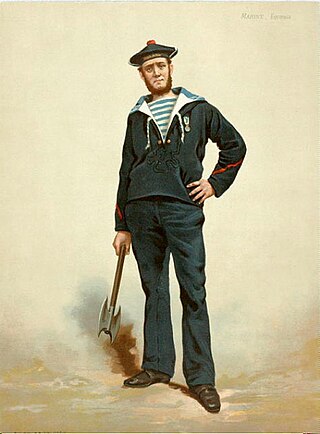A coat of arms is a heraldic visual design on an escutcheon, surcoat, or tabard. The coat of arms on an escutcheon forms the central element of the full heraldic achievement, which in its whole consists of a shield, supporters, a crest, and a motto. A coat of arms is traditionally unique to the armiger. The term "coat of arms" itself, describing in modern times just the heraldic design, originates from the description of the entire medieval chainmail "surcoat" garment used in combat or preparation for the latter.

The Curtiss JN "Jenny" was a series of biplanes built by the Glenn Curtiss Aeroplane Company of Hammondsport, New York, later the Curtiss Aeroplane and Motor Company. Although the Curtiss JN series was originally produced as a training aircraft for the US Army, the "Jenny" continued after World War I as a civilian aircraft, becoming the "backbone of American postwar [civil] aviation".

The de Havilland Canada DHC-4 Caribou is a Canadian specialized cargo aircraft with short takeoff and landing (STOL) capability. The Caribou was first flown in 1958 and although mainly retired from military operations, is still in use in small numbers as a rugged bush airplane.

The Avro Anson is a British twin-engine, multi-role aircraft built by the aircraft manufacturer Avro. Large numbers of the type served in a variety of roles for the Royal Air Force (RAF), Fleet Air Arm (FAA), Royal Canadian Air Force (RCAF), Royal Australian Air Force and numerous other air forces before, during, and after the Second World War.

Navy blue is a dark shade of the color blue.

The Canadair CT-114 Tutor is a jet trainer that was designed and produced by Canadian aircraft manufacturer Canadair. It served as the standard jet trainer of the Royal Canadian Air Force (RCAF), and later Canadian Armed Forces, between the early 1960s and 2000.

Canadarm or Canadarm1 is a series of robotic arms that were used on the Space Shuttle orbiters to deploy, manoeuvre, and capture payloads. After the Space Shuttle Columbia disaster, the Canadarm was always paired with the Orbiter Boom Sensor System (OBSS), which was used to inspect the exterior of the shuttle for damage to the thermal protection system.

Independence Day, known colloquially as the Fourth of July, is a federal holiday in the United States which commemorates the ratification of the Declaration of Independence by the Second Continental Congress on July 4, 1776, establishing the United States of America.

The de Havilland Canada DHC-2 Beaver is a single-engined high-wing propeller-driven short takeoff and landing (STOL) aircraft developed and manufactured by de Havilland Canada. It has been primarily operated as a bush plane and has been used for a wide variety of utility roles, such as cargo and passenger hauling, aerial application, and civil aviation duties.

The Avro Canada CF-100 Canuck is a Canadian twinjet interceptor/fighter designed and produced by aircraft manufacturer Avro Canada. It has the distinction of being the only Canadian-designed fighter to enter mass production.

The Royal Tyrrell Museum of Palaeontology is a palaeontology museum and research facility in Drumheller, Alberta, Canada. The museum was named in honour of Joseph Burr Tyrrell, and is situated within a 12,500-square-metre-building (135,000 sq ft) designed by BCW Architects at Midland Provincial Park.

Cold Lake is a city in east-central Alberta, Canada and is named after the lake nearby. Canadian Forces Base Cold Lake is situated within the city's outer limits.
Heritage Park Historical Village is a living history museum in Calgary, Alberta, Canada, on 127 acres (51 ha) of parkland on the banks of the Glenmore Reservoir, in the city's southwestern quadrant. The Historical Village part of the park is open 7 days a week (10-5) from the Canadian May long weekend through to the September Labour Day long weekend, and then weekends from Labour Day through to Canadian Thanksgiving weekend in mid October. Gasoline Alley Museum and the Railway Café are open year-round. As one of Canada's largest living history museums, it is one of the city's most visited tourist attractions. Exhibits span western Canadian history from the 1860s to the 1950s. Many of the buildings are historical and were transported to the park to be placed on display. Others are re-creations of actual buildings. Most of the structures are furnished and decorated with genuine artifacts. Staff dress in historic costume, and antique automobiles and horse-drawn vehicles service the site. Calgary Transit provides regular shuttle service from Heritage C-Train station. The park opened on July 1, 1964.

The Bristol Fairchild Bolingbroke is a maritime patrol aircraft and trainer used by the Royal Canadian Air Force during the Second World War. Produced by Fairchild-Canada, it was a license-built version of the Bristol Blenheim Mk IV bomber.

"This Masquerade" is a song written by American singer and musician Leon Russell. It was originally recorded in 1972 by Russell for his album Carney and as a B-side for the album's hit single "Tight Rope". The song was then covered on Helen Reddy's 1972 album, I Am Woman. It was then recorded by American vocal duo, the Carpenters, for their 1973 album Now & Then and as the B-side of the Carpenters's single "Please Mr. Postman". Three years later, "This Masquerade" was recorded by American singer and guitarist George Benson, who released it on his 1976 album, Breezin'. Benson's version, featuring Jorge Dalto on piano, was released as a single and became the first big hit of his career.
The visa policy of Canada requires that any foreign citizen wishing to enter Canada must obtain a temporary resident visa from one of the Canadian diplomatic missions unless they hold a passport issued by one of the 53 eligible visa-exempt countries and territories or proof of permanent residence in Canada or the United States.